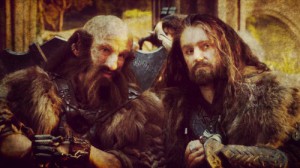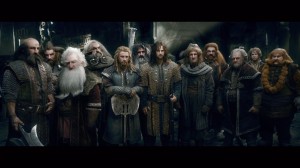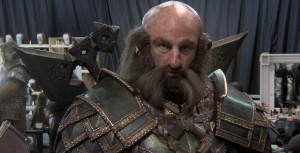Question: Did it change how you come to work now that there’s a movie out, you’ve seen the finished product in some ways, and yet there’s still more work to do?
Graham McTavish: (overlaps) I definitely feel– I felt beforehand, but I feel more so now, a great sense of responsibility to the fans of The Rings, to the fans of these films. Richard and I were just talking about this a while back, that we’ve got four demanding weeks ahead. It’s the climactic battle. It’s going to be a lot of effort, but we know that it’s important to really make that effort. Because you’re only ever going to– It’s going to last. This film will last. And you want to make sure that it’s the very best it can be from your individual viewpoint, and that’s what I try and take out of that.
 Question: Can you talk a little bit about Dwalin’s headspace in movie three? Because your character is so loyal to Thorin, but Thorin’s gone a little crazy.
Question: Can you talk a little bit about Dwalin’s headspace in movie three? Because your character is so loyal to Thorin, but Thorin’s gone a little crazy.
Graham McTavish: (overlaps) Yeah. (overlaps) Yeah. Yeah, no, I think he’s–I think his loyalty is very severely tested. And I think, in a way, he feels the disappointment in Thorin, in the way he’s behaving in Erebor, that much more keenly because of the undying loyalty that he’s shown. He talks about being ruled by consent. And that’s very important to Dwalin. “Yes, I will follow you anywhere, but I decide to do that.” And he really makes that very clear to Thorin. And I wanted very much for that– I think quite a pivotal moment is when your closest friend in a way, the guy that you’ve done the most with comes up to you and says, “Mate, you’re completely out of order. Completely out of order what you’re doing.” And that always makes you go, “Oh, wow.” A lot of people will let you get away with stuff, but when your closest friend does that– So I tried to do that. It’s good. I think it’s very interesting the way it concludes our relationship.
Question: And when you say that you’re giving your full commitment to the major battle scene in the next month, what does that actually mean from your point of view?
Graham McTavish: Well, I think it means not– When you think that you’re tired, when you think, “Oh, boy. Really? Really, do we have to go again?” “Yes, you do. You do. You have to go again.” Because every time you get a chance to go again, it can be better. And a director that I worked with a few years ago once said, “You get this chance to do it, and then that’s it.” You won’t get another chance to be Dwalin, you won’t get another chance to do The Hobbit. So you have to try and bring your best game whenever you’re asked to. And when you think you can’t do anymore, you try and draw and do a little bit more. That’s what I try to do.
 Question: What’s the tone of this franchise now, now that we’ve seen the first film? You’ve been working on it from day one. Was the tone of this franchise, what you saw on the screen, similar to what you had in your head when you first read the script?
Question: What’s the tone of this franchise now, now that we’ve seen the first film? You’ve been working on it from day one. Was the tone of this franchise, what you saw on the screen, similar to what you had in your head when you first read the script?
Graham McTavish: Well, when I first read– I would say the major difference for me was, reading the book, I feel like the films, especially into two and into three, are much darker. They become darker. The characters die in the book as well, but tonally, the journey towards that death is gradually darker. We’ve left the lightness and the slight joviality and naivety of the first film behind very much. And now we’re into something a lot more serious. And I love that. I love that. I think it’s a journey– When we hit the ground running in film two, people will be like, “Whoa! Gee, okay, they’re in real trouble.” And it’s good to feel that, you know. I like it.
Question: What intrigues you about watching Peter at work, coming in and knowing him as the director of the other films and then to get to know him as a real colleague and collaborator?
Graham McTavish: Yeah. I love how flexible he is, actually. I love that. I love how he creates organically in front of you. He comes with a plan, but that plan he can change at any moment, and you have to be able to adapt to that change of plan. You can’t come with a fixed idea of, “This is how I’m going to do this scene, and that’s just the way it is.” You have to be able to roll with a sort of jazz-like improvisational feeling to it. And I really respond to that. I like that atmosphere.
Question: I think we tend to think of him as this technical wizard, but he’s got to be great with you guys as actors.
Graham McTavish: (overlaps) Indeed. Yeah. Yeah, he is. And the other thing that Peter brings, I think very importantly, is humor. Which can’t be underestimated on a project like this because it’s so big, it could be so unwieldy, but he manages to focus it down to involve you in a fun way. Everybody, not just the actors, the crew and everything, he keeps things light. And that’s important because I think it could be overwhelming otherwise. But he’s great like that. He’s very funny.
Question: I noticed you playing with the drawstring on your vest a couple of times.
Graham McTavish: (overlaps) I might have been. I might have been. My worry beads.
 Question: But you’ve had so many pieces that you’ve worn now for so long. What is the part that you hate most about it and what is the part you’ve discovered you like best about it?
Question: But you’ve had so many pieces that you’ve worn now for so long. What is the part that you hate most about it and what is the part you’ve discovered you like best about it?
Graham McTavish: Okay, well, this is my third costume, my concluding costume. This one I actually haven’t worn that much. And I haven’t really grown to hate any part of it yet. Definitely in film one, the ax rig on the back was quite challenging. It was like carrying a couple of bags of cement around with you when you were going for a run. But to be fair to them, they’ve tried to balance the aesthetic need with the practical as much as they can. Because it does need to look as good as it does, but obviously we need to be able to move in it, and they’ve addressed that. When we first started, our boots– These are our stunt boots, so they look like little teeny boots. So they’ve got grip on them and everything like that. But the first boots we tried, they were quite a lot bigger, weren’t they? They were a lot heavier. Oh, my God, it was like diving boots, running around in those. But I’ve come to– We had a moment the other day when we were wearing our film one costume for the last time that goes into film two, and everyone was kind of sad. We all had photos taken with each other wearing it. And things like that, I think it’s important to mark them as well, to have a sense of ritual about these sort of jobs. Because as I say, I’ll never work on a project like this again. It’s almost certain. Because these projects are very rare. I will almost go so far as to say this is unique, this particular world that we inhabit doing this, and it’s good to remember it. While you’re doing it.
Question: Are you looking forward to spending some time, once the actual work part is done, with the fans and interacting with them?
Graham McTavish: I love it. I love it. I’ve gone to a couple of conventions. We did one in Germany and I went to one in Australia, and I love it. I love their enthusiasm. It’s genuinely humbling and lovely to see. Some of them, they are so talented as well. The stuff they– They bring books, they’ve drawn these incredible illustrations, paintings, they’ve knitted little– One woman’s knitted little versions of us. All of us. And they’re brilliant! Absolutely amazing. So yeah, I love interacting with them.
Question: Little bit scary though, too.
Graham McTavish: Well, no, not–
Question: (interrupts) When the fans are–
Graham McTavish: (interrupts) Yeah, not there. Yeah, it’s always difficult when they start asking you to speak Dwarvish. And then my actual knowledge of Dwarvish becomes very obvious. It’s quite embarrassing, really. But no, I love hanging out with them, actually.
Question: Do you have a go-to phrase? When they say, “Speak Dwarvish to me.”
Graham McTavish: Like a safety word.
Question: Well, no, I think that’s the follow-up question.
Graham McTavish: If I call out.
Question: What’s Dwarvish for “banana”?
Graham McTavish: That’s right. And somebody comes in and takes me away.
Question: When someone says, “Speak Dwarvish to me,” do you have a response that you give them at least?
Graham McTavish: Well, I always hope that William Kircher’s there. Because he speaks Dwarvish. As Bifur, that’s what he does. And I always refer to him. And also, I try and play the line that Dwarvish is a secret language. So that’s a good way out. You just say, “I’m sorry, but you’re not a Dwarf, so I can’t really talk to you about it.”
Female Crew Member: Okay, we good?
Question: We’re good. Thank you.
Graham McTavish: No, it was lovely. It’s always nice to see you, enjoy the rest of the day. It’ll be fun I think.
Question: Thanks so much, Graham McTavish.


